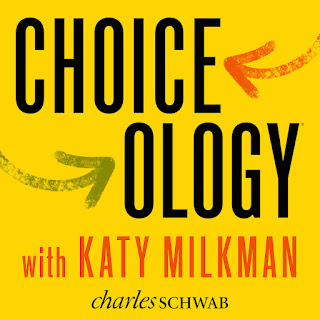One of my favorite podcasts is Amicus with Dahlia Lithwick. Recently, she's been promoting a podcast from Charles Schwab. Charles Schwab? My reptilian brain immediately thought of a podcast where listeners were bombarded with investment options and the lure of incredible returns, if, of course, you use Charles Schwab.
The name of the podcast was Choiceology. I decided to listen for a few minutes to get a good laugh.
I haven't been this wrong since I predicted that Tom Brady wouldn't retire until he was Medicare-eligible.
Choiceology is not about investments, but about making better life choices. See the subtle connection to investing through Schwab? But I admire that complexity and subtlety.
The podcast, which began in 2018, explores the lessons of behavioral economics, exposing the psychological traps that lead to expensive mistakes.
That's a mouthful. What does that mean? Let me explain. In the October 21, 2019, episode -- Take The Deal! -- Choiceology looks at a Deal Or No Deal TV contestant who forsook a guaranteed $333,000 payout to chase a larger prize. During the episode, host Katy Milkman talks about the concept of framing a decision a certain way can alter decisions.
That's where Choiceology excels -- in illustrating the myriad ways that our decisions on things big and small are often affected by unseen forces that are inside us. These forces have names like loss aversion, attribution error, and even decision-making based on our current physical state. NOTE: Try to get a morning court date because in the afternoon, judges tend to hand down harsher decisions.
Choiceology is teasing out why we do what we do. The guests are often academics, but thanks to the host, she keeps the conversation balanced -- not too much treble or bass, not too much psychobabble and talking down to listeners. This is not Dr. Phil.
Speaking of the host, Katy Milkman is a perfect choice to share stories of irrational decision-making—from historical blunders to the kinds of everyday errors that could affect your future. Nice goin' Schwab.
Katy Milkman is the James G. Dinan Professor at The Wharton School of the University of Pennsylvania, and holds a secondary appointment at Penn’s Perelman School of Medicine. Her research explores ways that insights from economics and psychology can be harnessed to change consequential behaviors for good, such as savings, exercise, student achievement, vaccination and discrimination.
Milkman co-founded and co-directs the Behavior Change for Good Initiative at the University of Pennsylvania.
In 2021 Milkman was named one of the world’s top 50 management thinkers and the world’s top strategy thinker by Thinkers50. The New York Times also named her bestselling book How to Change: The Science of Getting from Where You Are to Where You Want to Be one of the eight best books for healthy living in 2021.
Katy Milkman is the former president of the Society for Judgment and Decision Making, a TEDx speaker, an APS Fellow, and has published dozens of research articles in leading academic journals such as Nature and the Proceedings of the National Academy of Sciences. Her findings are regularly covered by major media outlets.
Yet for all Milkman's impressive credentials, podcast hosting requires a unique skill set that you can receive via numerous academic degrees. That's where Milkman excels. She's astute at framing and explaining the premise of an episode, and is a "natural" at interviewing the guest experts and keeps them from going into "academic mode."
Unlike some academic podcast hosts, Milkman oozes sincerity, agreeableness, and a command of the podcast flow. She likes the Captain of the Titanic, who was prescient enough to steam away from the glacier. Milkman wants listeners engaged, and she works hard to place us into that state of thoughtful reflection.
For example, in the December 2, 2019, episode, Milkman interviewed Duke Professor and psychologist Dan Ariely and Northwestern University professor Dean Karlan, who also founded StickK, a website and app that helps people commit to achieving goals using contracts and real goals.
In the episode, Milkman deftly narrates the battle between long-term goals and succumbing to the temptation of short term only rewards. Milkman uses the twin examples of Odysseus, who avoided the tantalizing but deadly songs of the sirens, and author Victor Hugo, who procrastinated so long on completing The Hunchback Of Notre Dame that he was forced to cleverly devise a method to overcome his own dithering.
In its episode archive, Choiceology can admit to tackling topics such as separating correlation from causation, predicting the likelihood of rare events, overweighting raw numbers and neglecting their relative value, and how bias often leads us to make mistakes.
Choiceology "seasons" seem to run about six episodes twice a year, with each episode being released every two weeks. Milkman values listeners' time because episodes run about 35–40 minutes.
I am instituting a new review ranking system that goes like this:
ONE EAR = only listen if you're trapped at your parents' home while they watch reruns of Pictionary on the Game Show Network.
TWO EARS = If you have some time on a long commute or routine task, try it out to see if the podcast fits you.
THREE EARS = Definitely listen. You're guaranteed to be entertained, informed, or persuaded.
FOUR EARS = A must-listen and EAR WORTHY because of the podcast's sonic excellence and the value you would derive from listening (or watching if it's on YouTube).
Choiceology -- FOUR EARS

Comments
Post a Comment
Thank You for your input and feedback. If you requested a response, we will do so as soon as possible.